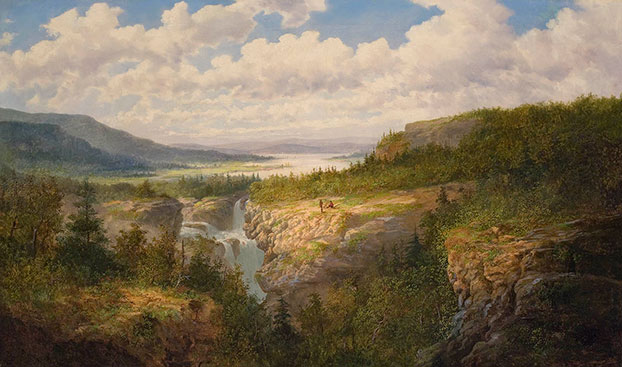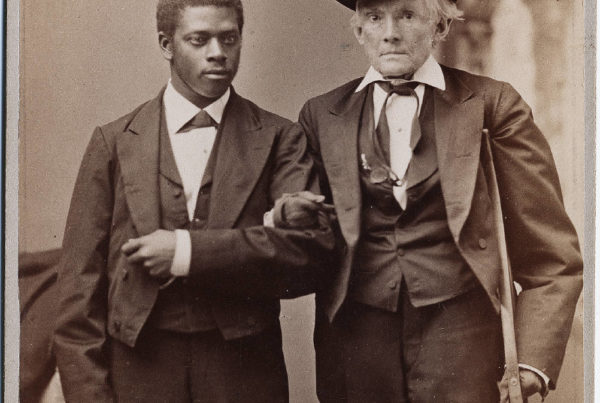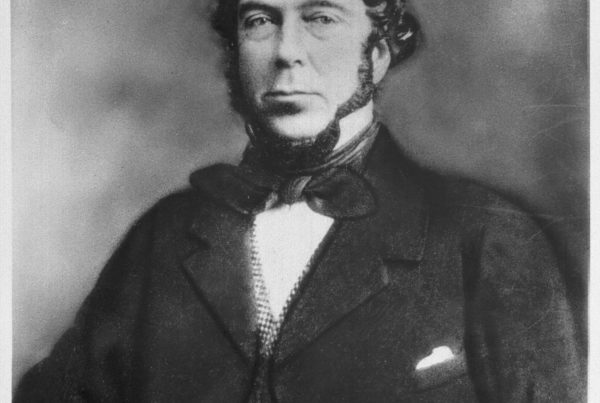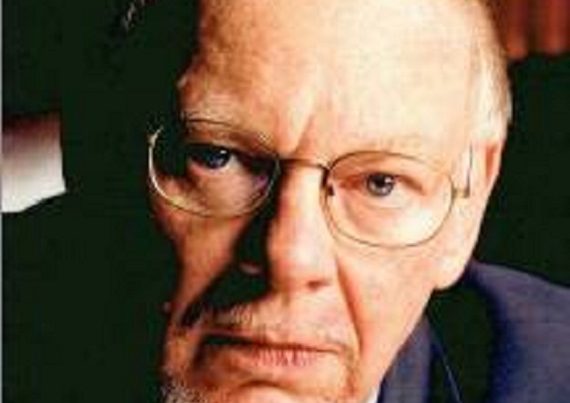It seems my mission here is to bring to your attention unfamiliar and unfashionable truths about American history. Let me give you another one. The American West, the frontier, was NOT conquered and settled by a “Nation of Immigrants.” George Washington was already the fifth generation of his family in Virginia, as were most of his neighbours.
There was a wave of Scots-Irish immigration before the Revolution. Thereafter, for almost a century, there was a trickle of immigrants but no wave. Not until the late 1840s, with the Irish potato famine and the Continental revolutions of 1848, was there another wave of immigrants large enough to change the character of the people. During that low-immigration century, the American population quadrupled—by natural increase of the original settlers—and civilised an immense area. Americans were a vigorous people with big families. For every son to inherit the family farm in the East there were four or five others who might look west for setting themselves up in life. The only Melting Pot going on was some mingling of different groups of the pre-Revolutionary settlers. The idea that a constant flow of foreigners was needed was absurd. Immigration was promoted not by the need to populate the West. Then as now the reason was the corporate thirst for cheap labour.
In the census of 1860, one half of the people then living who had been born in Virginia, North Carolina, South Carolina, Georgia, Kentucky, and Tennessee were living in a new place beyond their birthplace. This was the great seedbed of the American pioneer population in the northern west as well as the southern west.
It might be worthwhile at this point to mention Fischer’s descriptions of the four different British populations in colonial America before the War of Independence. Puritans from East Anglia who were the dominant force in New England. Gentry and commoners from the Southern English counties who settled the Tidewater South. Dissenters from the English Midlands and Wales who settled the Middle Colonies, or Delaware Valley. The last comers, the Scotch-Irish who populated the back country. All of these, generalising broadly, settled different parts of the West to which they imparted some of their character. I would like to make one amendment to Fischer. He under-estimates the extent to which by the very early 1800s the Tidewater and Scotch-Irish elements had merged, along with many other English and German settlers, into one Southern identity.
There has been a lot of writing recently about the Celts and the Scotch-Irish, particularly the popular book by Senator Jim Webb about the Scots-Irish. Celtic is never clearly defined in these discussions. It is true the British border country had a different culture from mainstream England, and that this culture was reproduced to some extent in America, but denominating it as Celtic or Scots-Irish is problematic. Calling anything “Southern” is a kiss of death, so while Webb praises the Scots-Irish as Confederate soldiers, he works hard to present them as something other than Southern, indeed portrays the older South as oppressive to the Scotch-Irish. This just does not accurately describe the mingling of two cultures in the piedmont of Virginia and the Carolinas even before the move over the Appalachians.
Alabama and Mississippi were settled faster than Indiana and Illinois because they had a valuable product, cotton, and access to ports for world trade. The settlement of the lower Midwest was by the same Southern people but slower—at least until Cyrus McCormick came from Virginia with his reaper which allowed larger scale cultivation on the prairies. Before about 1850 such cities as Detroit, Chicago, and Cleveland, soon to be gigantic powerhouses of American industry, were lesser places compared to Louisville, St. Louis, Memphis, New Orleans, and Galveston.
In the 1850s there occurred one of the most decisive and least noticed revolutions in American history. A wave of Northeastern and German immigrants transformed the predominant character of the Midwest from an ally of the South to a colony of the Northeast. It was at this point that the failed Illinois politician Abe Lincoln discovered that he might have a future in the new Republican party which represented the new Midwestern regime. He also at this time discovered that slavery might be a bad thing. The census demographics and voting data show clearly that it was this newly arrived population that carried the Midwest for the Republicans in 1860. The Republican party was never a national party. Its core was always New England, the areas of the Middle States settled by Yankees, and the Upper Midwest.
The movement of the Lincoln family—Virginia to Kentucky to southern Indiana to Illinois was typical of the early settlement of the Midwest. I might mention that Indiana literature begins with Edward Eggleston from Virginia and his book The Hoosier Schoolmaster. As late as the 1830s a majority of the members of the Illinois legislature were southern born. The state seal bore the words States Rights and the legalisation of slaveholding was seriously debated. Lincoln studied law with John T. Stuart, who had come from Virginia. When he entered politics Illinois was dominated by the Edwards family from Kentucky, and Lincoln himself married into a slave-holding Kentucky family. When Lincoln was challenged to a duel in Springfield (which never came off) it was fellow attorney Albert Bledsoe from Kentucky who showed him how to use the broadsword.
The older American historians, who actually knew something about the things they studied, saw the Southern origins of the lower Midwest clearly. Frederick L. Ogg in The Old Northwest and Everett A. Dick in The Dixie Frontier both treat the lower Midwest as part of a Southern frontier. Now, I will admit gladly a failing in my Southern-centered account of early Midwestern history. The second of Fischer’s groups, those Middle States people, were the predominant pioneers of Michigan, Wisconsin, and the upper Midwest. Being less distinctive and self-conscious than the other groups, their history is less clear and I plead guilty to having short-changed in this discussion their contribution to the Midwest and West. I have not studied this enough to have a conviction, but I think there is much evidence to show that the late-coming Yankees and Europeans overwhelmed the original pioneers of the upper Midwest while they despised and out-voted the Southerners in the lower Midwest.
Until the Yankees and Germans came, Illinoisians did not think of themselves as part of a North different from and inimical to the South. The primary cultural division was seen to be that between the Yankees and rest of America. Yankee did not mean Northerner. In fact, the term Yankee originates in New York as a term of derision for the peculiar people of New England and was not applied to all Northerners until The War. It apparently resulted from a Dutch pronunciation of the word “English,” perhaps as spoken by Indians.
The term Yankee followed New Englanders to their pioneer areas, western New York State and northern Ohio especially. Such people were regarded as notoriously self-centered and unpatriotic (indeed as traitors during the War of 1812) and as swindling traders and religious hypocrites. Until late in the prewar period this attitude toward New Englanders prevailed in New York and Pennsylvania and in the Midwest as much as in the South. Washington Irving’s portrayal of the despicable Ichabod Crane from Connecticut in his story of the headless horseman reflects the opinion of Yankees held by the Hudson Valley Dutch. His fellow New York writer James Fenimore Cooper despised New Englanders and defended the South from abolitionists. Another New York writer, Herman Melville, created the abominable Yankee, Captain Ahab, and wrote poetry sympathetic to his Southern fellow countrymen during the war and Reconstruction.
I’ll bet you never heard this. Young Mr. Lincoln used to tell Yankee stories—anecdotes and jokes ridiculing Yankee peddlers and preachers. In American folklore Young Mr. Lincoln is as handsome as Henry Fonda and rises to recognition because of his extraordinary integrity: he is a model pious, hard-working New England type. In fact, Lincoln’s popularity began with his story-telling prowess. After the women, children, and preachers had been put to bed, he would gather the boys around the stove at the country store and regale them. His most popular stories were the dirty ones for which he was very well known. But he also told Yankee jokes, which tells you about the Midwestern culture in which he grew up.
The central role of Southern pioneers was also true to a considerable extent of the Far West. Jim Bridger, Kit Carson, Charles Bent, and other major figures of Rocky Mountain exploration were Southern born. The first two Senators from California were Southerners as was one of the first Senators from Oregon. Experienced gold miners from North Carolina and Georgia were active in the California gold fields, and Oliver P. Fitzgerald from Tennessee was the most influential Protestant clergymen in the early history of the State. The first chairman of the Democratic party is Los Angeles was from Louisiana and left in 1861 to join the Confederate army.
The Southern nature of the West is nowhere more apparent than in the Cattle Kingdom. From early colonial times stockraising was the major industry of the backcountry and upcountry South as it had been of the British fringe regions. Daniel Boone’s first trip away from home was driving a hog herd to market in Philadelphia. The western term Maverick comes from Samuel Maverick who was born in Charleston and entered the stockraising business in upcountry South Carolina before moving to San Antonio. At the end of the War to Prevent Southern Independence Texans were impoverished but had large herds of wild cattle that could be rounded up and driven north to where people had money and wanted beef. Not until later did Northeastern and British capitalists get into the game.
I was told a few years ago that a large Confederate flag dominates the main room of the Cattleman’s Club in Cheyenne, Wyoming. I don’t know if this was true or is still true, but there is a reason that Owen Wister called his cowboy hero The Virginian. Without the cultural transmission of Southern chivalry to the West, a cowboy is just a proletarian who herds animals rather than a knight of the plains.
Another unfashionable truth. I said earlier that in 1860 that half the people born in the older regions of the South were living further west. This is true of the black population as well as the white. There is a common thesis of American history that stipulates a great division between the democratic West and the aristocratic slaveholding South. From the earliest there were black bond servants carried along in westward settlement. In the census of 1790 there were already thousands of slaves in Kentucky and Tennessee. We can’t know for sure, but it would not been unlikely that when he rode out of Salisbury, North Carolina, to try his luck in Tennessee, Andrew Jackson brought along a black boy to cook and take care of the horses. There is no problem with slaveholders moving west. In fact, it is an advantage because the greatest need of a new territory is labour. This is even more true if you understand the forgotten nature of antebellum American society. One-fourth of all Southern families owned slaves. The vast majority of these slaveholders owned one or two black families who lived and worked with them. This is perfectly adaptable to the frontier. For that matter, there are plenty of accounts of whole plantations making their way from the Carolinas to Alabama or Mississippi in a wagon train containing the extended white family, numerous black families, the family furniture and heirlooms, and tools, seed, and herds of livestock for the new settlement.
In American thinking West is good and South is bad. So if you see something you like in Texas it is Western but if you don’t like it is must be Southern. This is a nonsensical word game that can only appeal to people as ignorant and dishonest as American historians and journalists. Traditional Texas is or was what it was—i.e., Southern culture expanded into a new environment. It could not be anything else. Any division between the South and the western pioneer is entirely imaginary. Boone and Crockett were small slaveholders such as I have described. Daniel Boone’s grand-nephew commanded Bedford Forrest’s elite scouts in the Confederate army. Crockett’s nephew was a member of the Confederate Congress. The son of William Clark of Lewis and Clark was a Confederate officer.
The Southerners were first over the Appalachians and first over the Ohio and the Mississippi. During the Revolution George Rogers Clark went out to what is now Indiana and defeated the British forces. He was not sent by the United States but by the State of Virginia. After the Revolution, Virginia generously gave up the vast Northwestern territory it had secured, now Ohio, Indiana, Illinois, Michigan, and Wisconsin, for the use of all Americans.
By contrast, at the time of the Louisiana Purchase, the young Yankee poet William Cullen Bryant wrote a nasty poem to Jefferson which expressed the New England attitude toward the West:
Go wretch, resign thy presidential chair,
Disclose thy secret measures foul or fair,
Go, search with curious eyes for horned frogs
‘Mid the wild wastes of Louisiana bogs;
Or, where the Ohio rolls his turgid stream
Dig for huge bones, they glory and thy theme.
The New Englanders threatened secession over the Louisiana Purchase and again when the State of Louisiana was admitted to the Union. As Americans built new States in the West, New England was concerned only with its own loss of power and imagined dangers from an unruly, unsupervised Western population. They considered themselves to be pure Anglo-Saxons while the rest of Americans were of inferior breed. The primary impulse of abolitionism was not sympathy for the black people but the desire to purge evil and make over all the country into the New England self-image of righteousness, order, and prosperity. The West was a threat to their economic and cultural hegemony just as was the South. (Another glaringly obvious aspect of American history that is never told.) Why, those Louisiana people were barely even white and—shudder, Heaven forbid!—were Catholics. At the beginning of the War of 1812, the U.S. General William Hull, who was from Connecticut, surrendered the Midwest to the British without firing a shot. It had to be reconquered by mostly Kentucky volunteers commanded by William Henry Harrison of Virginia.
Here is the great man of Massachusetts, Daniel Webster, commenting on the far West that we are studying here:
“What do we want with this vast and worthless area, of this region of savages and wild beasts, of deserts, of shifting sands and whirlwinds, of dust, of cactus and prairie dogs; to what use could we ever hope to put these great deserts, or those endless mountain ranges, impenetrable and covered to their very base with eternal snow? What can we ever hope to do with the western coast of 3,000 miles, rockbound, cheerless, uninviting and not a harbor in it?”
While other American men were braving the Rockies, New Englanders were celebrating the great American outdoors with Thoreau’s little frog pond barely out of sight of Boston and Emerson’s declamations about “Self-Reliance.”
Here is another story that is never told. In 1830 there was the famous Webster-Hayne debate in which folklore tells us that Daniel Webster’s great oratory vindicated the wonderful American Union against Southern sectionalism. The debate came about over an effort of Senator Foot of Connecticut to close off settlement of the West by prohibiting land sales. Webster was defending not the Union but New England parochialism. Hayne of South Carolina was defending the West. Nor did Webster win the debate either in the Senate or public opinion. Somewhat in the same way that Lincoln became a Christian after he was dead, Webster won the Webster-Hayne debate after the War to Prevent Southern Idependence.
By contrast, here is the evil Southern sectionalist, John C. Calhoun, on the West, at widely separated times in his career: (He played an important role in securing the Southwest and Oregon for the U.S.)
“In the immense valley of the Mississippi, with its mighty products, there is space enough for all to participate without conflict or injury to each other. For my part, I behold every improvement, in whatever part of the Union, with pleasure, as tending to the advantage of the whole.”
Arguing for selling the public lands at prices in the reach of all. They “should be disposed of accordingly, in the manner best calculated to diffuse a flourishing population over the vast regions placed under our dominion; a policy, the wisdom of which is best illustrated by the wonderful success, with which it has been accompanied.”
“Would it benefit the man, with many children but little money, who might desire to emigrate to the West to improve the condition of himself and family? . . . .Mr. Calhoun observed that he should be very much governed in the vote he should give on this occasion by the opinions of gentlemen coming from the new States. . .. ”
“Our population is steadily—he might say rapidly—advancing across the continent, to the borders of the Pacific Ocean. Judging from past experience, the tide of population will sweep across the Rocky Mountains, with resistless force, at no distant period; when what we claim will quietly fall into our hands, without expense or bloodshed.”
For better or worse it was Southerners who acquired the vast territories that carried the United States across a continent to the Pacific, who had the vision of building a great free country. A few Southerners, like Randolph of Roanoke, warned that this was not a good idea because it portended empire. But Jefferson saw the West as a place where new self-governing States, as free and freedom-loving as the old, would be created by pioneers. He calmly expected that the new States would in the future break away from the U.S. and form one or more new confederacies. It would not matter because the important thing was not being under one government but rather self-government. And the new States would be peopled by Americans, our own descendants and kinsmen.
After awhile the Northeastern elite realised that if it could break the power of the South, then the West was a good deal after all. It offered a vast opportunity, not for self-governing commonwealths but for a centralised economy to exploit vast natural resources to the benefit of those who knew how to work the game. The Republican triumph in 1865 changed the nature of the West and redirected its future as it changed Jefferson’s Empire of Liberty into an empire of profit for the rich and well-connected..
The evasive labelling of things Southern is a pervasive kind of imperialism and explains the neglect of the essential Southern in the Western. Music that used to originate in the South was called “country and western.” I once read in a conservative publication a celebration of the contribution to American life of the great “Midwestern” humourist Will Rogers. Well, Rogers was from Oklahoma, which might in some respects be called Midwest. He was certainly not produced by Chicago. He was part Cherokee and his father was a slave-holding officer in the Confederate Cherokee brigade. Much of his famed radio humour had to do with gently ridiculing Yankee Republicans like Coolidge and Hoover and popular delusions of the Northern urban population. Will Rogers told those who bragged that their ancestors had come over on the Mayflower that his people had met the boat. He was not promoting Indian rights or multiculturalism. He was making fun of the pretensions of Boston the way Southern humourists had been doing for a century.
SOURCE: From The Rockford Institute 2009 Summer School on “The American West.”







